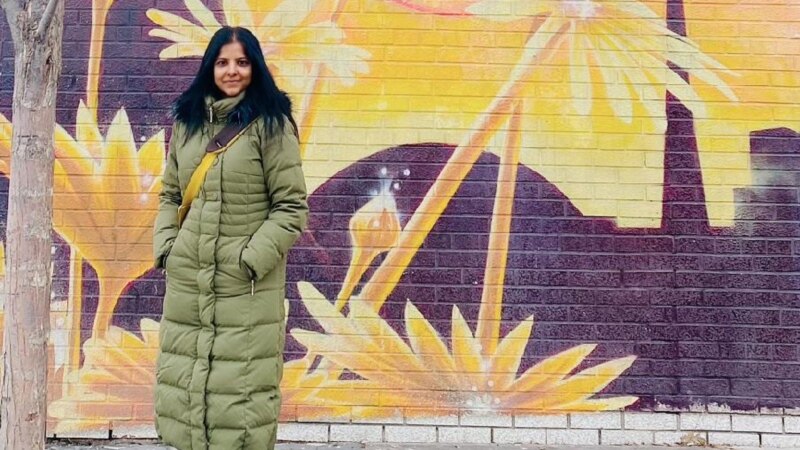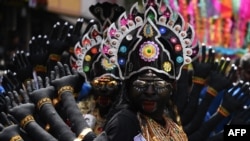This website uses cookies so that we can provide you with the best user experience possible. Cookie information is stored in your browser and performs functions such as recognising you when you return to our website and helping our team to understand which sections of the website you find most interesting and useful.

There is public outrage in India over the depiction of a Hindu goddess that critics say disparages the religious figure.
The image appears in a poster promoting the new short film Kaali by Canadian-based Indian filmmaker Leena Manimekalai. The poster depicts Hindu goddess Kaali smoking a cigarette and holding an LGBTQ+ flag.
After filmmaker Leena Manimekalai shared the poster in a tweet Saturday, the day a museum in Toronto hosted the film’s first showing, the image of the smoking goddess sparked a furor in India with angry Hindus demanding a ban on the film and legal action against the filmmaker.
Monday, the Indian High Commission in Canada said it had received complaints from Hindu community leaders over the “disrespectful depiction of Hindu gods” in the poster, and it urged the Canadian authorities and the event organizers to withdraw all “provocative” materials related to the film.
A day later, the museum issued an apology, saying the film was no longer being shown there, and that it regretted having “inadvertently caused offense to members of the Hindu and other faith communities.”
Manimekalai wrote and directed the film as one of the cohorts of the academic program “Under the Tent” managed by Toronto Metropolitan University.
In the film, Manimekalai is an incarnation of the goddess Kaali. Living as a queer female filmmaker in Toronto, she attempts to find belonging in a land stolen from its rightful inhabitants — the First Nations.
As the goddess of death, time and change, the dilemma of the reincarnated goddess in the film finds a resolution only at the end, when it dawns on her that ultimately, the land can be owned by no one; the universe is in a state of constant flux. The promotional poster shows a scene in which, dressed as the goddess Kaali, Manimekalai shares a cigarette with a homeless man.
“When I embody Kaali, I am Kaali myself. My Kaali is queer. She is a free spirit. She spits at the patriarchy. She dismantles Hindutva. She destroys capitalism,” Manimekalai told VOA. “She embraces everyone with all her thousand hands.”
Death threats
Manimekalai’s tweet of the poster went viral Saturday with tens of thousands of members of the Hindu community retweeting it with a hashtag reading “Arrest Leena Manimekalai.”
Police cases were filed against her in several states for “hurting the religious sentiments” of Hindus.
One Hindu group said in a police complaint that the depiction of the goddess Kaali in the poster was “completely unacceptable to Hindus” and Manimekalai “deliberately distorted the Hindu religion and culture with malicious intent to insult Hindu religious feelings.”
Manimekalai said she and her family members received death and rape threats from more than 200,000 social media accounts. In a video that surfaced online, a Hindu priest from the north Indian temple town Ayodhya threatened: “Do you want your head to be severed from your body?”
In the southern state of Tamil Nadu, Manimekalai’s native state in India, police arrested the female leader of a Hindu right-wing group for allegedly threatening her with death. The leader allegedly posted a video online in which she condemned her using strong words and threatened to kill her.
Twitter on Wednesday removed Manimekalai’s poster tweet.
Reacting to Twitter’s action, she said in a tweet, "Will @TwitterIndia withhold the tweets of the 200000 hate mongers?! These lowlife trolls tweeted and spread the very same poster that they find objectionable. Kaali cannot be lynched. Kaali cannot be raped. Kaali cannot be destroyed. She is the goddess of death."
The filmmaker said that the reaction in India against her film cannot be termed just an “outrage.”
“If a person in the street pounces upon you, it is a crime. If a person violates your body in a public place, it is sexual harassment. If a person throws acid on your face, it is an attempt of murder. If a person uses foul language against you, it is abuse. If a person goes after your family and friends and supporters and threatens them, it is violence. If all this is done by a mob, how can you call it just an 'outrage'?” she asked.
“How can I report 200000 ids? Where should I report? Who is going to take action? There is no law in India. The Constitution of the country is dead.”



 Africana55 Radio
Africana55 Radio 

